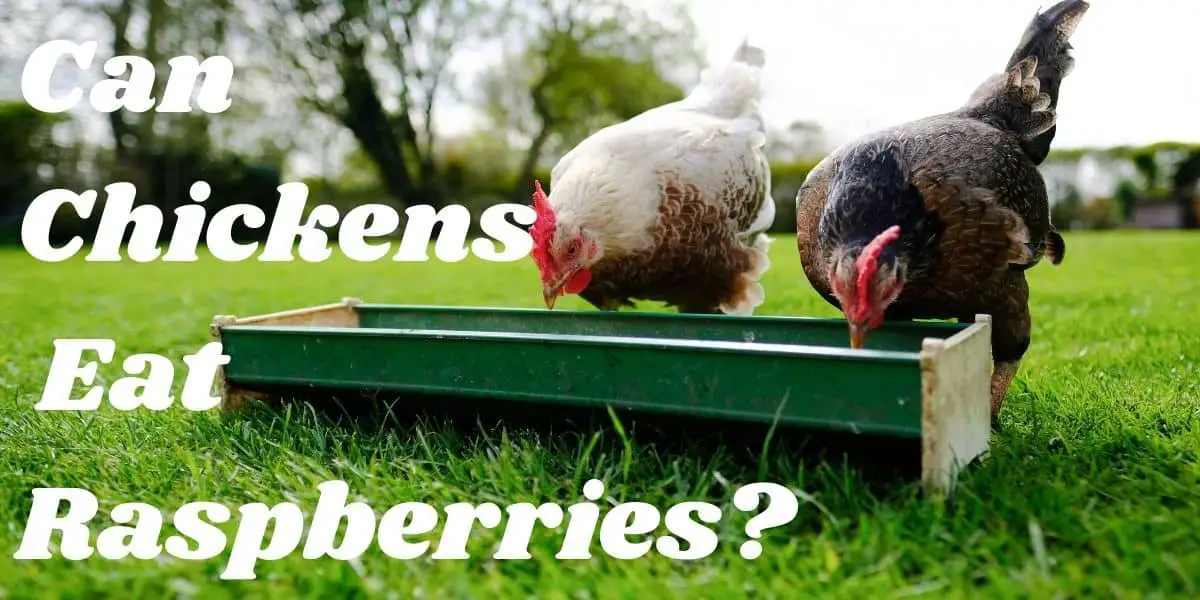Raspberries can be commonly found in many home gardens, but is it okay for your chickens to eat them? In short, the answer is yes! If you like keeping your chickens on an all-natural diet, you’ll love all the nutritious benefits that raspberries have to offer your egg-laying friends.
Raspberries contain many nutritious benefits and make a great diet supplement for egg-laying hens. Many chicken owners are cautious when it comes to their overall diet, especially when using chickens as a source of food. It’s natural to want your chickens to be as healthy as they can be and making sure their diet is full of nutrient-rich foods is how you achieve this.
So, when it comes to raspberries you may be wondering what benefits this special fruit can offer and how often you should provide them. In this article, we’ll break down everything you need to know.
Table of Contents
The Benefits of Raspberries
This tiny fruit is packed full of benefits, providing an abundance of nutrients, antioxidants, and preventatives from diseases. While there are many types of raspberries, from black, gold, and purple, we’ll be looking into the most common, the red raspberry.
Red raspberries are relatively high in antioxidants, including vitamin C. Antioxidants are known for helping cells prevent and recover from diseases. While chickens are not susceptible to as many diseases as humans, it’s never a bad idea to help boost their immune system and keep cells working at their best.
Similar to humans, however, chickens can acquire cancer. The antioxidants in raspberries are also beneficial for killing cancer cells in multiple parts of their bodies. Even eaten in moderation, raspberries greatly improve a chicken’s ability to fight off cancer cells.
Another great benefit of raspberries is that they are high in fiber, which is an essential part of a chicken’s diet. Fiber allows your chickens to digest their food better and works to prevent pathogens from forming in the gut. This fiber is not needed in abundance either, a little goes a long way for the health of your chickens.
Nutritional Value
To break it down more simply, here’s a look at the nutrient value in one cup (123 grams) of red raspberries.
- Calories: 65
- Carbs: 15 grams
- Fiber: 8 grams
- Protein: 1.5 grams
- Fat: 0.8 grams
Overall, it’s easy to see that raspberries are a very healthy fruit. These berries do not provide very many calories, but they do provide a lot of fiber and vitamins. While it’s hard to say exactly how many vitamins are provided to chickens upon eating, here’s a look at the % Daily Values for one cup (123 grams) of raspberries when consumed by a human.
- Vitamin C: 53% DV
- Calcium: 3% DV
- Iron: 4% DV
- Vitamin B-6: 5% DV
- Magnesium: 6% DV
As mentioned above, vitamin C is an excellent source of antioxidants which helps boost the immune system and prevent a variety of diseases.
Calcium plays a huge role in chickens being able to lay healthy eggs. Chickens that don’t have enough calcium can produce eggs with weak shells or none at all. While most chicken feed supplies enough calcium for a healthy chicken, it’s nice to know that raspberries can offer some as well.
Believe it or not, but chickens can be anemic, meaning that their blood lacks iron. While this is generally not the case for most chickens, a fruit-like raspberries that provide a small amount of iron is a good thing.
Vitamin B-6 is another important vitamin that chickens need. Chickens that lack this vitamin may suffer from a poor appetite, slow growth, and restless behavior. While raspberries aren’t the main source of this vitamin for their diet, it does provide it as a supplement.
Lastly, magnesium is essential for a chicken’s bone development and metabolism. Like with the rest of these vitamins, you’ll want their main diet to provide them with the proper amount of magnesium. However, just in case your chickens may need an extra boost, raspberries are there to provide it.
You can buy vitamin supplements to add to their food from online stores like Amazon. ( Link here )
How Often to Provide Raspberries to Your Chickens
As amazing and nutritional as they are, raspberries should only be fed to your chickens on occasion. The main source of your chickens’ nutrients should come from their main diet.
Fruits like raspberries should only make up less than 10% of their entire diet, so it’s best to offer them as a weekly treat instead of a staple food.
Like with any animal, it’s always nice to provide a treat every now and then and the best part about raspberries is that they’re highly nutritional and your chickens will love being able to indulge in them.
Plus, if you’re growing raspberries in your garden, you’ll be happy to know that all parts of the plant are safe for them to eat.





